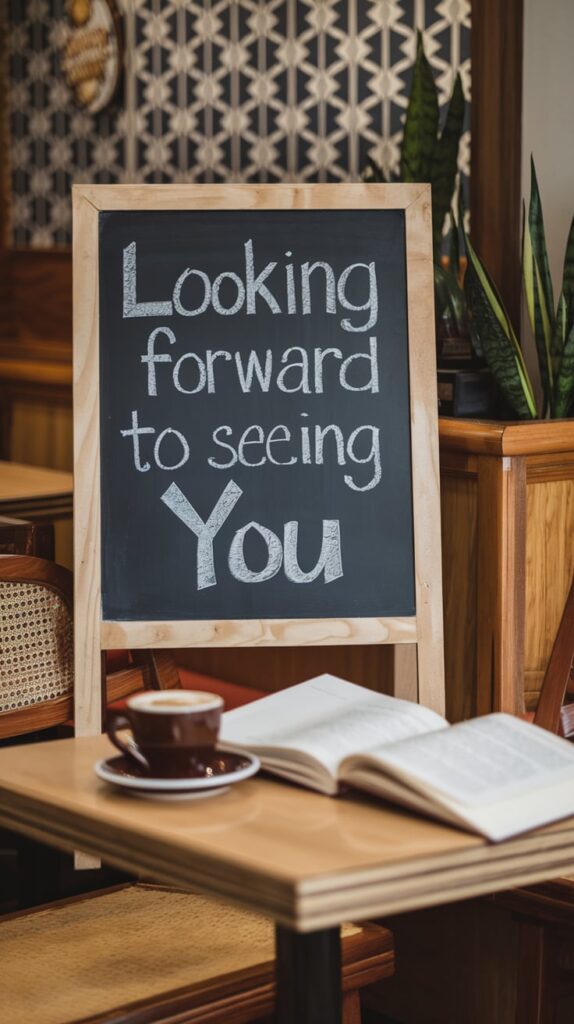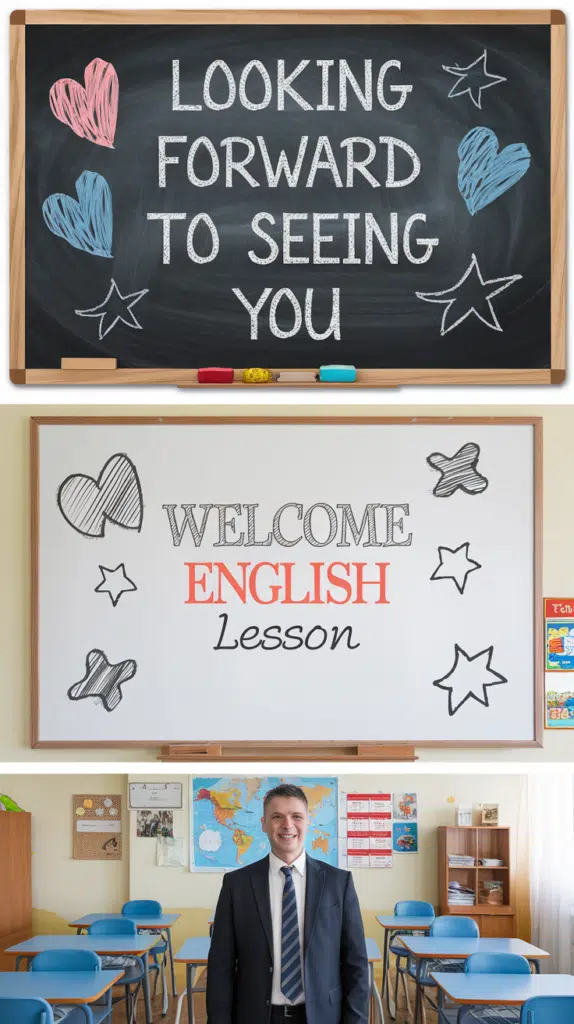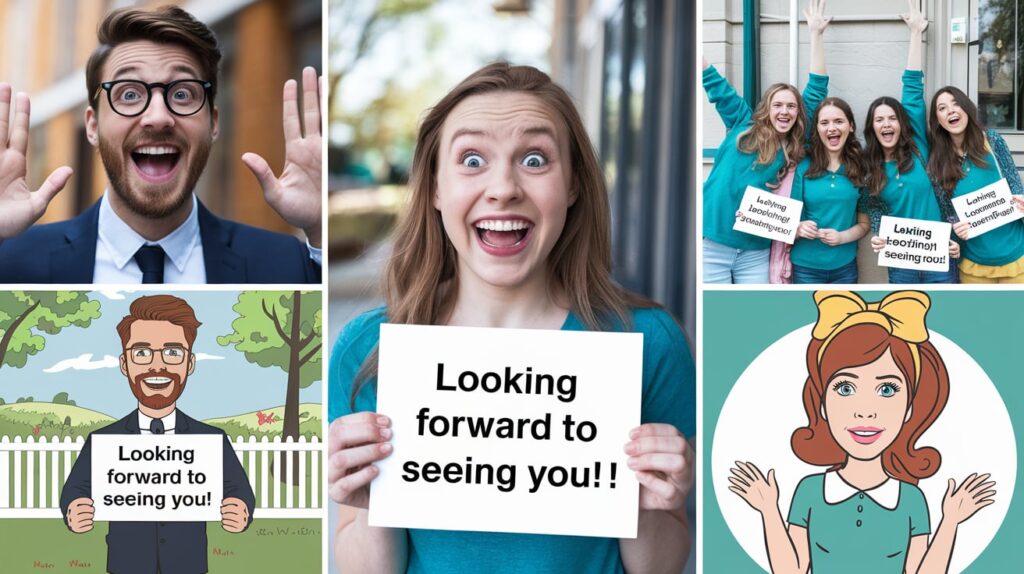The phrase “Looking forward to seeing you” is commonly used to express excitement and anticipation when anticipating a future meeting. Whether you’re meeting a friend, a colleague, a client, or a family member, this phrase is often used to convey a polite and eager tone.
However, it can sometimes become repetitive, especially if you are writing multiple emails or messages in a professional or personal setting. Fortunately, there are numerous ways to express the same sentiment with a bit of variety and creativity.
This article will explore 15 other ways to say “Looking forward to seeing you”, diving deep into the meanings, usage, and scenarios where these alternatives can be employed.
What Does “Looking Forward to Seeing You” Mean?

The phrase “Looking forward to seeing you” can be understood as an expression of excitement or eagerness about a future meeting or event. It’s a polite way to express anticipation for an upcoming encounter.
This phrase suggests that the speaker is eagerly awaiting the opportunity to meet or spend time with the person they are addressing.
For example:
- Personal: “I’m looking forward to seeing you at the reunion next weekend!”
- Professional: “I’m looking forward to seeing you at the quarterly meeting tomorrow.”
In these examples, both the personal and professional versions of the phrase express eagerness, but the context determines the tone of the phrase. It can be used in both formal and informal situations, making it a versatile expression in communication.
The Importance of Variety in Language Use
While “Looking forward to seeing you” is a great go-to phrase, overusing it in emails or messages can make communication feel formulaic. It’s important to have a variety of expressions at your disposal to keep your communication fresh and engaging.
Whether you’re writing formal emails to clients or informal texts to friends, having a range of alternatives helps convey your excitement and keeps your messages interesting.
read more : The Ultimate Guide: Verbs That Start with B – Grammar Beacon
15 Alternatives to “Looking Forward to Seeing You”
Here are 15 other ways to say “Looking forward to seeing you”, complete with examples and explanations for each alternative. These variations will help you communicate with enthusiasm while adding flair and specificity to your messages.
1. Can’t Wait to See You
This is one of the most common alternatives to “Looking forward to seeing you”, often used in informal settings to express excitement or eagerness.
- Example: “Can’t wait to see you at the concert this weekend!”
- Tone: Informal, friendly, and enthusiastic.
- When to use: Casual conversations with friends or family.
This phrase carries a sense of urgency and excitement, making it ideal for personal relationships. It is often used in messages or texts to express eagerness for social gatherings, vacations, or reunions.
2. I’m Eager to See You
A slightly more formal version of “Can’t wait to see you,” this phrase conveys both excitement and a polite tone.
- Example: “I’m eager to see you at the team meeting tomorrow.”
- Tone: Semi-formal, polite, and enthusiastic.
- When to use: Professional settings, such as work emails, as well as formal social gatherings.
Using “eager to see you” conveys anticipation while maintaining a degree of formality. This makes it appropriate in situations where you’re addressing colleagues, clients, or people you do not know well personally but still want to express excitement toward.
3. Excited to See You
This alternative emphasizes enthusiasm and is similar to “Can’t wait to see you,” but it can be used in both formal and informal contexts.
- Example: “I’m excited to see you at the wedding next month!”
- Tone: Casual, yet versatile enough for professional and social contexts.
- When to use: Ideal for both personal and professional settings.
Using “excited to see you” is less urgent than “can’t wait,” but it still conveys positive feelings about the upcoming meeting or event.
4. I’m Looking Forward to Catching Up
This is perfect for situations where the meeting or event is meant to involve conversation, especially after not seeing someone for a while.
- Example: “Looking forward to catching up with you over lunch next week.”
- Tone: Casual and friendly.
- When to use: For personal meetings, especially with friends or family after a period of separation.
This phrase works well when there is a social or emotional connection, such as meeting a friend you haven’t seen in years or reconnecting with a former colleague.
5. I’m Thrilled to See You

A more enthusiastic way of expressing excitement, this phrase conveys high energy and anticipation.
- Example: “I’m thrilled to see you at the graduation ceremony next month!”
- Tone: Very enthusiastic, informal, and warm.
- When to use: Family gatherings, friends, or events you are particularly excited about.
This expression communicates a sense of joy and energy, perfect for situations where you are genuinely excited about spending time with someone.
6. I’m Keen to See You
This alternative works well in British English but is also understood in American English. It expresses anticipation with a slightly more polite tone.
- Example: “I’m keen to see you at the conference next week.”
- Tone: Formal or semi-formal, polite.
- When to use: Professional or polite settings, particularly in British culture.
This phrase is more restrained than “excited” or “thrilled,” making it appropriate for professional emails or situations where you want to convey respect or formality.
7. Can’t Wait to Reconnect
This is a great phrase for situations where you are reconnecting with someone after a long time apart.
- Example: “Can’t wait to reconnect with you at the reunion this weekend!”
- Tone: Casual and enthusiastic.
- When to use: For events where you’ll be meeting old friends or colleagues.
It emphasizes the importance of reconnecting and catching up, which makes it especially suitable for reunions, old friends, and long-distance relationships.
8. I’m Anticipating Our Meeting
A formal version of “I’m looking forward to seeing you,” this phrase is great for business and academic settings.
- Example: “I’m anticipating our meeting on Wednesday to discuss the proposal.”
- Tone: Formal, professional.
- When to use: Professional settings like meetings, conferences, or seminars.
This phrase shows that you are not only excited but also have an intellectual or business interest in the upcoming encounter.
read more : 15 Other Ways to Say “My Work Here Is Done” – Grammar Beacon
9. I’m Excited About Our Upcoming Meeting

A variation of “Looking forward to seeing you” that emphasizes the upcoming nature of the meeting, making it suitable for more formal contexts.
- Example: “I’m excited about our upcoming meeting with the client next week.”
- Tone: Formal and professional.
- When to use: Business meetings or events, especially in professional emails.
This version expresses enthusiasm about an event but keeps a professional tone, which is ideal for corporate communications.
10. Looking Forward to Spending Time with You
This phrase is a great option when the focus is not just the meeting, but the quality time you’ll share with the person.
- Example: “Looking forward to spending time with you at the cabin this weekend.”
- Tone: Casual, friendly.
- When to use: Family gatherings, vacations, and any event focused on quality time.
It’s especially appropriate when the meeting is centered around personal connections and enjoying each other’s company.
11. I’m Eagerly Anticipating Our Time Together
This is a more formal, yet still heartfelt, way of saying you’re excited to meet someone.
- Example: “I’m eagerly anticipating our time together at the gala next month.”
- Tone: Formal, respectful.
- When to use: Professional events, important gatherings, or formal social events.
The use of “eagerly anticipating” conveys a higher level of respect and formality, ideal for business dinners, networking events, or other formal occasions.
12. Can’t Wait to Catch Up
This variation adds a personal touch, ideal for informal settings where you’re excited to chat or reconnect.
- Example: “Can’t wait to catch up with you over coffee tomorrow!”
- Tone: Informal, friendly.
- When to use: Casual settings with friends or family.
It emphasizes the desire to reconnect and share experiences, making it perfect for friendship or family conversations.
13. Looking Forward to Our Conversation
This is a great phrase when you want to emphasize the dialogue aspect of the meeting or event.
- Example: “Looking forward to our conversation about the project tomorrow.”
- Tone: Formal or semi-formal, depending on context.
- When to use: In professional meetings, interviews, or any situation where the focus is on the conversation.
It shifts the focus from just the meeting to the content of the encounter, which is often important in professional
or academic settings.
14. Excited to Meet You
This phrase works well when you’re meeting someone for the first time or after a long period of not meeting.
- Example: “Excited to meet you at the interview tomorrow!”
- Tone: Casual to formal, depending on context.
- When to use: New meetings, such as job interviews, first-time meetings, or new social interactions.
This expression highlights excitement about the opportunity to meet someone new or rekindle an old relationship.
15. I’m Eager to Meet You
Similar to “I’m excited to meet you,” this phrase is formal yet warm, and expresses anticipation for the event or meeting.
- Example: “I’m eager to meet you at the seminar this afternoon.”
- Tone: Formal, polite, and respectful.
- When to use: Professional or formal settings, such as job interviews, conferences, or academic events.
This phrase strikes a balance between enthusiasm and professionalism, making it perfect for business or academic contexts.
Summary of Key Points:
- Informal Alternatives: Phrases like “Can’t wait to see you,” “Can’t wait to reconnect,” and “Looking forward to catching up” are best used in friendly or casual settings, especially when reconnecting with someone after a long time.
- Formal Alternatives: Phrases such as “I’m anticipating our meeting,” “I’m excited about our upcoming meeting,” and “I’m eager to meet you” are suitable for professional settings, client meetings, or any formal context where you want to express polite enthusiasm.
- Polite and Respectful Tone: Alternatives like “I’m keen to see you” and “I’m eagerly anticipating our time together” convey a level of formality that is appropriate for formal events, professional gatherings, or polite social contexts.
- Enthusiastic Expressions: Phrases like “I’m thrilled to see you,” “Excited to meet you,” and “I’m excited to see you” express a high level of excitement and enthusiasm and are great for family events, weddings, and personal meetings.
By using these various alternatives, you can enhance the dynamism of your communication and better tailor your expressions of anticipation to the context and the relationship with the recipient.
Conclusion

In summary, “Looking forward to seeing you” is a powerful and versatile phrase used to convey excitement and anticipation for a future meeting or event. However, incorporating variety into your language helps avoid repetition and keeps your communication engaging.
By using alternatives like “Can’t wait to see you,” “Excited to meet you,” or “I’m eager to see you,” you can tailor your language to suit different contexts, whether professional or personal.
From formal business emails to casual conversations with friends, these alternatives add nuance, clarity, and personality to your communication.
With the right expression in hand, you’ll not only make your language more dynamic but also create stronger connections with your audience, colleagues, friends, or loved ones. So, the next time you feel like saying “Looking forward to seeing you”, remember that you have many options to express the same sentiment in a way that best fits the situation!

James Logan is a seasoned blogger and language enthusiast behind Grammar Beacon. With years of experience in grammar and writing, James shares his expertise through insightful and engaging content. His passion for clear communication and linguistic precision shines in every post, making complex grammar concepts accessible and enjoyable for readers. Follow James for expert advice and tips to refine your writing skills.







